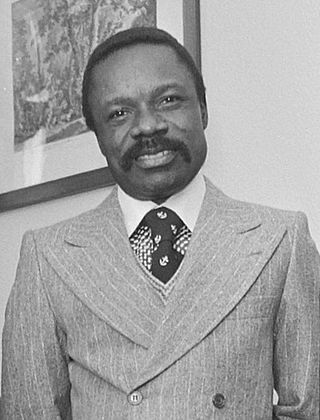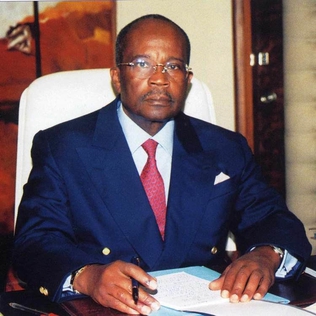| |||||
| Decades: | |||||
|---|---|---|---|---|---|
| See also: | |||||
The following lists events the happened during 2016 in Gabon .
| |||||
| Decades: | |||||
|---|---|---|---|---|---|
| See also: | |||||
The following lists events the happened during 2016 in Gabon .

Gabon, officially the Gabonese Republic, is a country on the Atlantic coast of Central Africa, on the equator, bordered by Equatorial Guinea to the northwest, Cameroon to the north, the Republic of the Congo on the east and south, and the Gulf of Guinea to the west. It has an area of 270,000 square kilometres (100,000 sq mi) and a population of 2.3 million people. There are coastal plains, mountains, and a savanna in the east. Libreville is the country's capital and largest city.

The politics of Gabon takes place in a framework of a republic whereby the president of Gabon is head of state and in effect, also the head of government, since he appoints the prime minister and his cabinet. The government is divided into three branches: the executive headed by the prime minister, the legislative that is formed by the two chambers of parliament, and the judicial branch. The judicial branch is technically independent and equal to the two other branches, although in practice, since its judges are appointed by the president, it is beholden to the same president. Since independence the party system is dominated by the conservative Gabonese Democratic Party.

Omar Bongo Ondimba was a Gabonese politician who was the second president of Gabon for almost 42 years, from 1967 until his death in 2009. Bongo was promoted to key positions as a young official under Gabon's first President Léon M'ba in the 1960s, before being elected vice-president in his own right in 1966. In 1967, he succeeded M'ba to become the country's second president, upon the latter's death.

Jean Ping is a Gabonese diplomat and politician who served as Chair of the African Union Commission from 2008 to 2012. Born to a Chinese father and Gabonese mother, he is the first individual of Chinese descent to lead the executive branch of the African Union.

Ali Bongo Ondimba, also known as Ali Bongo and Ali Ben Bongo, is a Gabonese former politician who was the third president of Gabon from 2009 to 2023. He is a member of the Gabonese Democratic Party. He is the son of Omar Bongo, who was president of Gabon from 1967 until his death in 2009. During his father's presidency, he was Minister of Foreign Affairs from 1989 to 1991, represented Bongoville as a deputy in the National Assembly from 1991 to 1999, and was the Minister of Defense from 1999 to 2009. After his father's death, he won the 2009 Gabonese presidential election. He was reelected in 2016, in elections marred by numerous irregularities, arrests, human rights violations, and post-election protests and violence.

Presidential elections were held in Gabon on 27 November 2005. Incumbent President Omar Bongo, in power since 1967, sought another seven-year term against four other candidates. According to an announcement of results by the country's interior minister, the result was a victory for Bongo, who received 79.2% of the vote. Bongo was sworn in for another seven-year term on 19 January 2006.

Jean Eyeghé Ndong is a Gabonese politician. He was the Prime Minister of Gabon from January 20, 2006 to July 17, 2009. He was also the First Vice-president of the Gabonese Democratic Party (PDG) until 2009.

Casimir Marie Ange Oyé-Mba was a Gabonese politician. After serving as Governor of the Bank of Central African States (BEAC) from 1978 to 1990, Oyé-Mba was Prime Minister of Gabon from 3 May 1990 to 2 November 1994. Subsequently, he remained in the government as Minister of State for Foreign Affairs from 1994 to 1999, Minister of State for Planning from 1999 to 2007, and Minister of State for Mines and Oil from 2007 to 2009.
André Mba Obame was a Gabonese politician. After serving as an adviser to President Omar Bongo in the 1980s, he was a minister in the government of Gabon from 1990 to 1991 and again from 1997 to 2009; during that time, he was identified with the reformist wing of the ruling Gabonese Democratic Party (PDG). He held the key post of Minister of the Interior from 2006 to 2009 and then briefly served as Minister of the Coordination and Follow-up of Government Action in mid-2009. He was an independent candidate in the 30 August 2009 presidential election and placed third with 25.33% of the vote, according to official results, but he claimed victory and alleged that the PDG candidate, Ali Bongo, won through fraud.
Richard Auguste Onouviet is a Gabonese politician who served as President of the National Assembly of Gabon from 8 April 2016 to 30 April 2018. Holding a succession of ministerial portfolios, Onouviet served in the government of Gabon as Minister of Water and the Environment from 1999 to 2002, Minister of Mines, Energy, and Oil from 2002 to 2007, Minister of Planning from 2007 to 2009, and as Minister of Decentralization and Urban Policy in 2009. A member of the Gabonese Democratic Party (PDG), he has been a Deputy in the National Assembly since 2009.

Early presidential elections were held in Gabon on 30 August 2009. They took place due to the death of incumbent President Omar Bongo on 8 June, after more than 41 years as the sole president of Gabon. While the constitution stated that interim President Rose Francine Rogombé should organise elections within 30 to 45 days, the Constitutional Court accepted the government's request for a delay due to the circumstances.
Jean-Félix Mouloungui is a Gabonese politician who was appointed to the government of Gabon as Minister of Small and Medium-Sized Enterprises in October 2009.

Franck Emmanuel Issoze-Ngondet was a Gabonese diplomat and politician who served as Prime Minister of Gabon from 2016 to 2019.

Presidential elections were held in Gabon on 27 August 2016. Incumbent President Ali Bongo Ondimba ran for re-election and was challenged by former Minister of Foreign Affairs Jean Ping. On 31 August, the electoral commission proclaimed Bongo's re-election with a margin of less than two percent. Large protests broke out in the capital Libreville after the results were announced. Irregularities such as Haut-Ogoou showing that 99.9% of the electorate had voted and Bongo had received 95.5% of the votes led to observers questioning the conduct of the election.
After the 27 August 2016 presidential election in Gabon, in which President Ali Bongo Ondimba was narrowly re-elected against opposition candidate Jean Ping, armed clashes between supporters of Ping, who claimed victory, and police erupted, resulting in the authorities blocking the internet in Libreville.

Pacôme Moubelet-Boubeya is a Gabonese politician. He served as the Minister of Foreign Affairs of Gabon from 2020 to 2022, he previously served in the same role from 2016 to 2017. He also was Minister of the Interior from 2015 to 2016.

The second inauguration of Ali Bongo Ondimba for his second seven-year term as the third president of Gabon occurred on 27 September 2016 after the August 2016 presidential election. This was the second time Ali Bongo took the oath after he was first sworn into office on 16 October 2016.
The 2009 Gabonese protests was rioting and popular disturbances with immediate unrest and violent opposition-led street demonstrations and growing civil disobedience movement across Port Gentil and Libreville in Gabon after the immediate results of the 2009 Gabonese presidential election was announced. Two were left dead amid the unrest, clashes and fighting between the rival forces. French interference in the actions sparked national outrage, one of the causes if the immediate unrest.

General elections were held in Gabon on 26 August 2023. Incumbent president Ali Bongo ran for re-election, representing the Gabonese Democratic Party, which had ruled the country continuously since its independence from France in 1960, including 41 years under Bongo's father, Omar.

On 30 August 2023, a coup d'état occurred in Gabon shortly after the announcement that incumbent president Ali Bongo Ondimba had won the general election held on 26 August. It was the eighth successful coup to occur in West and Central Africa since 2020.
![]() Media related to 2016 in Gabon at Wikimedia Commons
Media related to 2016 in Gabon at Wikimedia Commons